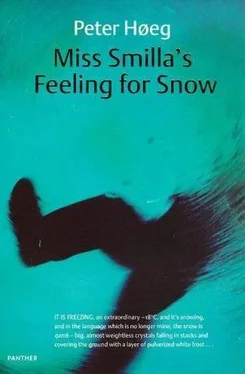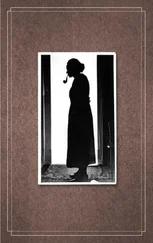Peter Høeg - Smilla's Sense of Snow aka Miss Smilla's Feeling for Snow
Здесь есть возможность читать онлайн «Peter Høeg - Smilla's Sense of Snow aka Miss Smilla's Feeling for Snow» весь текст электронной книги совершенно бесплатно (целиком полную версию без сокращений). В некоторых случаях можно слушать аудио, скачать через торрент в формате fb2 и присутствует краткое содержание. Жанр: Современная проза, на английском языке. Описание произведения, (предисловие) а так же отзывы посетителей доступны на портале библиотеки ЛибКат.
- Название:Smilla's Sense of Snow aka Miss Smilla's Feeling for Snow
- Автор:
- Жанр:
- Год:неизвестен
- ISBN:нет данных
- Рейтинг книги:3 / 5. Голосов: 1
-
Избранное:Добавить в избранное
- Отзывы:
-
Ваша оценка:
- 60
- 1
- 2
- 3
- 4
- 5
Smilla's Sense of Snow aka Miss Smilla's Feeling for Snow: краткое содержание, описание и аннотация
Предлагаем к чтению аннотацию, описание, краткое содержание или предисловие (зависит от того, что написал сам автор книги «Smilla's Sense of Snow aka Miss Smilla's Feeling for Snow»). Если вы не нашли необходимую информацию о книге — напишите в комментариях, мы постараемся отыскать её.
Smilla's Sense of Snow aka Miss Smilla's Feeling for Snow — читать онлайн бесплатно полную книгу (весь текст) целиком
Ниже представлен текст книги, разбитый по страницам. Система сохранения места последней прочитанной страницы, позволяет с удобством читать онлайн бесплатно книгу «Smilla's Sense of Snow aka Miss Smilla's Feeling for Snow», без необходимости каждый раз заново искать на чём Вы остановились. Поставьте закладку, и сможете в любой момент перейти на страницу, на которой закончили чтение.
Интервал:
Закладка:
I take out a book marked 1991 and page through it at random. It says: salary, pension, harbor fees, labor costs, room and board, tonnage charges, laundry and dry cleaning, travel expenses, shareholders' dividends, paid to Struer Chemical Laboratory.
Rows of keys are hanging to the right, on the wall of the safe. I find the one marked ARCHIVES.
When I push the door of the safe closed, the numbers disappear one by one, and when I leave the room and go downstairs in the dark, it once again says CLOSED.
The first room in the archives is the entire basement under one wing of the building. A low-ceilinged room with countless wooden shelves, countless quantities of ledger paper wrapped in brown paper, and filled with the air that always hovers over vast paper deserts, enervating and drained of all moisture.
The second room is perpendicular to the first. It has the same kind of shelving. But it also contains archive cabinets with flat drawers for topographical maps. A hanging file with hundreds of maps, some of them clamped onto brass rods. A locked wooden cabinet, like a coffin ten yards long. That must be where the drilling cores sleep.
The room has two windows high on the wall facing Strand Boulevard, and four toward the factory grounds. This is where my preparations with the plastic bags come in. I thought I would cover the windows so I can turn on a light.
There are women who paint their own attractive attic apartments themselves. Reupholster the furniture. Sandblast the façade. I have always called on a professional. Or let it wait until next year.
These windows are large, with iron bars on the inside. It takes me forty-five minutes to drape all six.
When I'm finished I don't dare turn on the overhead lights, after all, but make do with my flashlight. Merciless order ought to prevail in archives. They are quite simply the crystallization of a wish to put the past in order. So that busy, energetic young people can come waltzing in, select a specific case, a specific core sample, and waltz out again with precisely that segment of the past.
These archives, on the other hand, leave something to be desired. There are no signs on the shelves. There are no numbers, dates, or letters on the spines of the filed material. And when I select a couple at random, I get: Coal petrographic analyses on seams from Atd (low group profiles), Nicgssuaq, West Greenland, and On the use of processed raw cryolite in the production of electric light bulbs, and Demarcation of borders at the land parceling of 1862.
I go upstairs and make a phone call. It always feels wrong to call someone on the phone. It feels especially wrong to call from the scene of the crime. As if I had gotten a direct line to police headquarters to turn myself in.
"This is Elsa Lübing."
"I'm standing here amid mountains of papers trying to remember where it says something about the fact that even the chosen ones risk being led astray."
First she hesitates, then she laughs.
"In Matthew. But perhaps more appropriate on this occasion would be Mark, where Jesus says: `Are you not therefore mistaken, because you do not know the Scriptures nor the power of God?' "
We giggle together on the phone.
"I disavow any responsibility," she says. "I've asked for a cleanup and cataloging for forty-five years."
"I'm so glad there's something you didn't manage to get done."
She's silent on the phone.
"Where?" I ask.
"There are two shelves above the bench-the long wooden case. That's where the expedition reports are. Arranged alphabetically according to the minerals they were looking for. The volumes closest to the window are the trips that had both a geological and a historical purpose. The one you're looking for should be one of the last ones."
She's about to hang up. "Miss Lübing," I say.
"Yes?"
"Did you ever take a sick day?"
"The Lord has watched over me."
"I thought so," I say. "I could sort of tell." Then we hang up.
It takes me less than two minutes to find the report. It's in a black ring binder. There are forty pages, numbered in the lower-right-hand corner: It's just the right size to stuff into my handbag. Afterward I have to remove the plastic blackout curtains, and I'll disappear down Kalkbrænderi Road without a trace, just the way I arrived.
I can't restrain my curiosity. I take the report over to the far corner of the room and sit down on the floor, leaning against a bookcase. It gives under my weight. It's a flimsy, wooden bookcase. They never thought that the archives would get so big. That Greenland would be so surprisingly inexhaustible. They've simply filled up the shelves. The traces of time on a flimsy wooden skeleton.
"The geologic expedition of the Cryolite Corporation of Denmark to Gela Alta, July through August 1991," it says on the title page. Then follow twenty closely typed pages of expedition report. I skim the first pages, which start off by describing the objective of the expedition: "To investigate the deposits of granular ruby crystals on the Barren Glacier on Gela Alta." The text also lists the five European members of the expedition. Among others, a professor of Arctic ethnology, Dr. Andreas Fine Licht, Ph.D. The name rings a bell somewhere deep inside me. But when I try to listen, it stops. I assume that his presence explains why it says at the bottom that the expedition is supported by the Institute for Arctic Ethnology.
Next comes a report with both an English and a Danish section. I page through this part, too. It concerns a rescue operation from Holsteinsborg to Barren Glacier by helicopter. The helicopter wasn't able to land very close because of the risk of avalanche from the engine noise. That's why it turned around and they sent a Cherokee 6-3000 instead, whatever that is, but it says that it landed on the water, with a pilot, navigator, doctor, and nurse on board. There's a brief report from the rescue team and a doctor's certificate from the hospital. There were five fatalities. One Finn and four Inuits. One of the Inuits was named Norsaq Christiansen.
There is a twenty-page appendix. A summary of the mineralogical samples brought back. The logs. A series of black-and-white aerial photos of a glacier, splitting and floating around a bright, fractured conical cliff.
A plastic folder contains copies of about twenty letters, all concerning transport of the bodies.
The whole thing looks clean and aboveboard. It's tragic, and yet something that might happen. Nothing that could explain why a little boy, two years later, falls off a rooftop in Copenhagen. It occurs to me that I've been seeing ghosts. That I've gone astray. That it's all a figment of my imagination.
For the first time I notice how burdened the room is with the past. With hundreds of days, hundreds of numbers, hundreds of people, who every day, year in and year out, have eaten their two sandwiches in the cafeteria and shared a beer with Amanda, but never more than one except at Christmas, when the laboratory spikes a 6oz gallon carboy of 96-proof disinfecting alcohol with cumin for the Christmas party. The archives are shouting at me that they have been content. And that's also what it said in the book at the library, and what Elsa Lübing said: "We were content. It was a good place to work."
As so often before, I feel a yearning to participate, to take part. In Thule and Siorapaluk no one ever asked people what they did, because everybody was a hunter, everybody had work to do. In Denmark, if you are a wage earner, it lends meaning and fulfillment to your life to know that now you're rolling up your sleeves and putting a pen behind your ear and pulling up your bootstraps and going to work. And when you're off, you watch TV or visit friends or play badminton or take a night course in Basic. You don't live life in a cellar beneath Strand Boulevard in the middle of the night at Christmastime.
Читать дальшеИнтервал:
Закладка:
Похожие книги на «Smilla's Sense of Snow aka Miss Smilla's Feeling for Snow»
Представляем Вашему вниманию похожие книги на «Smilla's Sense of Snow aka Miss Smilla's Feeling for Snow» списком для выбора. Мы отобрали схожую по названию и смыслу литературу в надежде предоставить читателям больше вариантов отыскать новые, интересные, ещё непрочитанные произведения.
Обсуждение, отзывы о книге «Smilla's Sense of Snow aka Miss Smilla's Feeling for Snow» и просто собственные мнения читателей. Оставьте ваши комментарии, напишите, что Вы думаете о произведении, его смысле или главных героях. Укажите что конкретно понравилось, а что нет, и почему Вы так считаете.




![Рута Шепетис - Ashes in the Snow [aka Between Shades of Gray]](/books/414915/ruta-shepetis-ashes-in-the-snow-aka-between-shades-thumb.webp)







